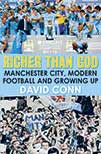 Manchester City, modern football and growing up
Manchester City, modern football and growing up
by David Conn
Quercus, £16.99
Reviewed by David Stubbs
From WSC 307 September 2012
Buy this book
Guardian contributor David Conn is one of the foremost UK journalists when it comes to football and finance, bringing his legal expertise to bear on the murky and often dubious relationship between the two. In 2008, Manchester City were controversially taken over by Sheikh Mansour bin Zayed of Abu Dhabi, with the club suddenly benefiting from the hundreds of millions he decided to invest in them from afar, despite rarely visiting the Etihad Stadium. The money he has dropped into the game has, many argue, affected it for the worse. David Conn is a Manchester City fan. This book exists within that somewhat awkward triangle.
Richer Than God is not an exposé of dirty, hidden dealings, not least because the Mansour’s takeover is in plain sight. There are no anonymous consortiums or obscure issues of leverage. Nor are there suspicions that the club’s new owner is a chancer, lacking in true financial clout and looking to milk the club or sell off the ground for property development. The Sheikh’s fortunes are too huge for such petty vice.
When Conn puts forward objections to the desirability of a club becoming such a rich man’s plaything, the Sheikh’s representative Khaldoon al-Mubarak “did not so much defend what they were doing as fail to understand the question”, especially with the precedents of Jack Walker and Roman Abramovich already established. What’s the problem?
Conn is further disarmed by the accommodation of the PR-canny new owners. Although he does not get to interview the Sheikh (no one does), there is no attempt to suppress or blank Conn, despite his prominence as an investigative journalist. He’s invited to interview Al-Mubarak, who fields all his questions politely, and to enjoy the lavish hospitality of the “inner sanctum” of the Etihad Stadium.
Conn does not temper his objections, particularly to the social inequality that enabled the Sheikh, and City, to enjoy such largesse. He does, however, find himself concluding that in terms of their provision for the club, their investment not just in players like Carlos Tevez but in its facilities and corporate structure, they are the best owners of the club he has known in his lifetime.
If this sounds disappointing to WSC readers, it should be observed that Richer Than God is an excellent book, which covers a vast range of subject matter, all bolted together with Conn’s typically pertinent grasp of relevant facts and figures. It takes in many things: the often luckless history of Manchester City and the city itself; Conn’s own autobiography as a football fan; the effects of Conservative austerity measures on the city; and, following a terse five-minute interview with ex-chairman Francis Lee, a disillusionment that comes with the knowledge of the chasm between football as a modern-day business and its romantic origins.
Lee taking over City should have been the unifying of these opposites; when he revealed he’d not watched a football game in five years and fired club legends Tony Book and Colin Bell en route to driving the club down two divisions, it turned out otherwise. Although Conn distances himself from some of the more craven gratitude to Mansour, he does identify with a fellow fan, contemplating the club currently: “It isn’t the City I love – but if all this were to happen to anybody, I’m glad it’s happened to us.”
Buy this book
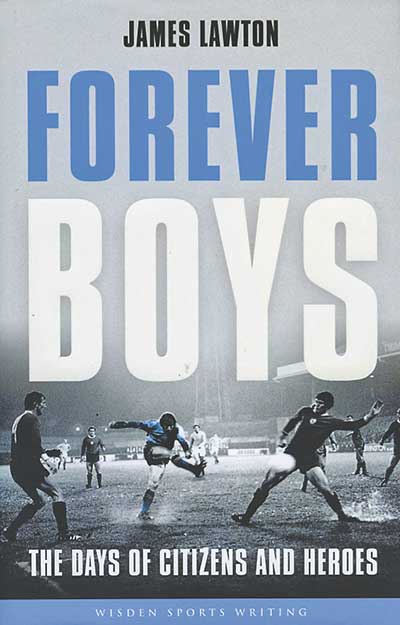 The days of
Citizens & heroes
The days of
Citizens & heroes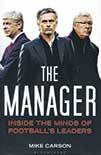 Inside the minds of football’s leaders
Inside the minds of football’s leaders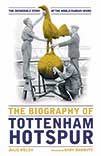 by Julie Welch
by Julie Welch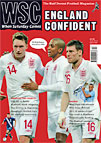
 Manchester City, modern football and growing up
Manchester City, modern football and growing up